Pawn beats the king
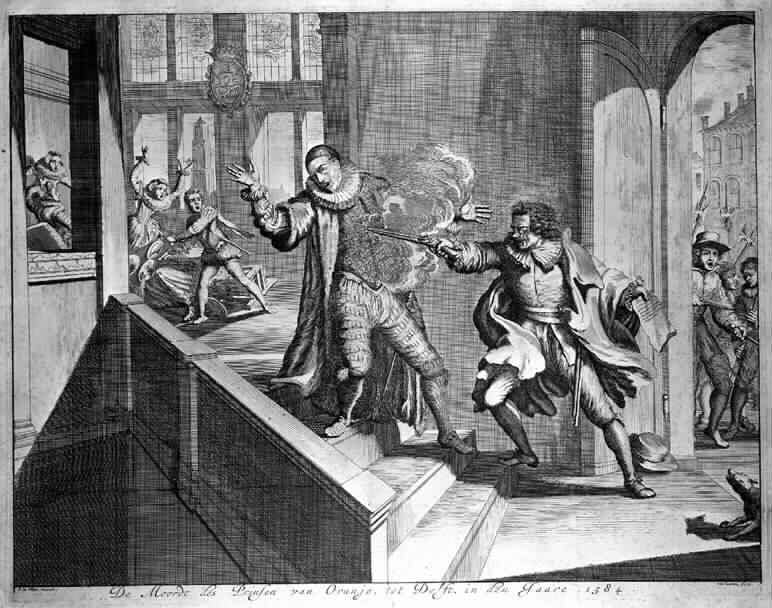
Against the king
In 1555, Philip II received from Father Charles V the rights to manage all possessions, including the Netherlands. The relationship with the Netherlands was extremely complicated. And although Philip made Prince William I of Orange a member of the Council of State and awarded the Order of the Golden Fleece, this did not prevent him from pursuing a harsh and tough policy in the Netherlands. In principle, it is easy to understand the Spanish monarch. The territory under control resembled a hornet's nest. The national liberation movements gained frightening strength, the local nobles considered themselves almost gods and jealously monitored the observance of their rights and privileges. Moreover, in the Netherlands, which irritated the Catholic Philip, there was too much religious diversity. But he could not burn the nest. The fact is that there was an agonizing war with France and it was the Dutch commanders who were taking it upon themselves. Therefore, while the conflict would not be extinguished, the monarch could not come to grips with the "thorn". And the plans for the account of the Dutch nobility he had the most categorical - to eliminate the entire estate.
In the end, Philip decided that a truce must be negotiated with the French. Spending time resolving external problems, he risked launching an internal problem. And Philip acted very clever and cunning. He knew that William of Orange was a brilliant diplomat. Therefore, it was he who was appointed responsible ambassador from Spain, on whose shoulders lay negotiations with the French. And Orange, as they say, could. He managed to turn the talks in such a way that France, having agreed to peace, in fact, practically acknowledged its defeat. Although in fact it was completely wrong. Wilhelm, having coped with the task, probably hoped that Philip would appreciate it on merit. But he was greatly mistaken. Everything that happened is part of the plan of the Spanish king. Philip wanted to enlist the support of the French monarch in order to work together to organize a mass terror of Protestantism in both states.
Now it is necessary to make a small digression. The tough policy that Philip loved so much caused fears among the Dutch nobility. They were justly afraid of losing their positions. Oppositional sentiments grew stronger, but the nobility needed a strong leader. And this was in the face of William. The prince promised all the disgruntled that he would be able to achieve and preserve titles, and property, and privileges. But in return he demanded support. And not only military, but also financial. The Dutch nobles agreed.
Soon Philip II received a message in which demands were made regarding the future of the Netherlands. The nobles wanted not only the standard “observance of the rights and freedoms of the country”, but still did not want to see Spanish soldiers on their land, and most importantly - Antoine Perrin de Granvel - Chief Counselor of the Spanish King in the Netherlands. They did not forget, of course, to mention the fact of persecution on religious grounds. In general, the requirements were not so much, but they all went against the views of the Spanish monarch.
Wilhelm understood that he had started a dangerous game. But he had no choice, by and large. He became the head of the opposition movement, which caused not only approval and respect among the nobles, but significantly strengthened his position among the citizens and residents of numerous villages. In their eyes, William I of Orange became a national hero who, not frightened by the Spanish monarch, began to defend the national interests of all the inhabitants of the Netherlands. The interesting thing is that many nobles who eagerly expressed their thoughts about the struggle against Spain, in fact, were very much afraid of the consequences. Everyone understood that the confrontation with such a powerful opponent could have ended sadly. Therefore, some were very afraid and in every possible way hesitated to make decisions. It came to such an extent that Wilhelm simply became disillusioned with his "allies." But he was not going to give up, because the life of the country and his life were at stake. Therefore, Wilhelm began to look for solutions to the problem. And he found them. The prince was supported by the German princes, the French Huguenots, as well as numerous Calvinist adherents. Yes, having gathered a religiously motley company under its wing, the Orange was in danger. But the risk was justified. And in general, as you know, in war all means are good. Moreover, he himself was not distinguished by some kind of fanatical commitment to any kind of faith. For Wilhelm, she was an excellent way to strengthen her own political position. And he perceived the need for maneuvering between groups as an everyday necessity.
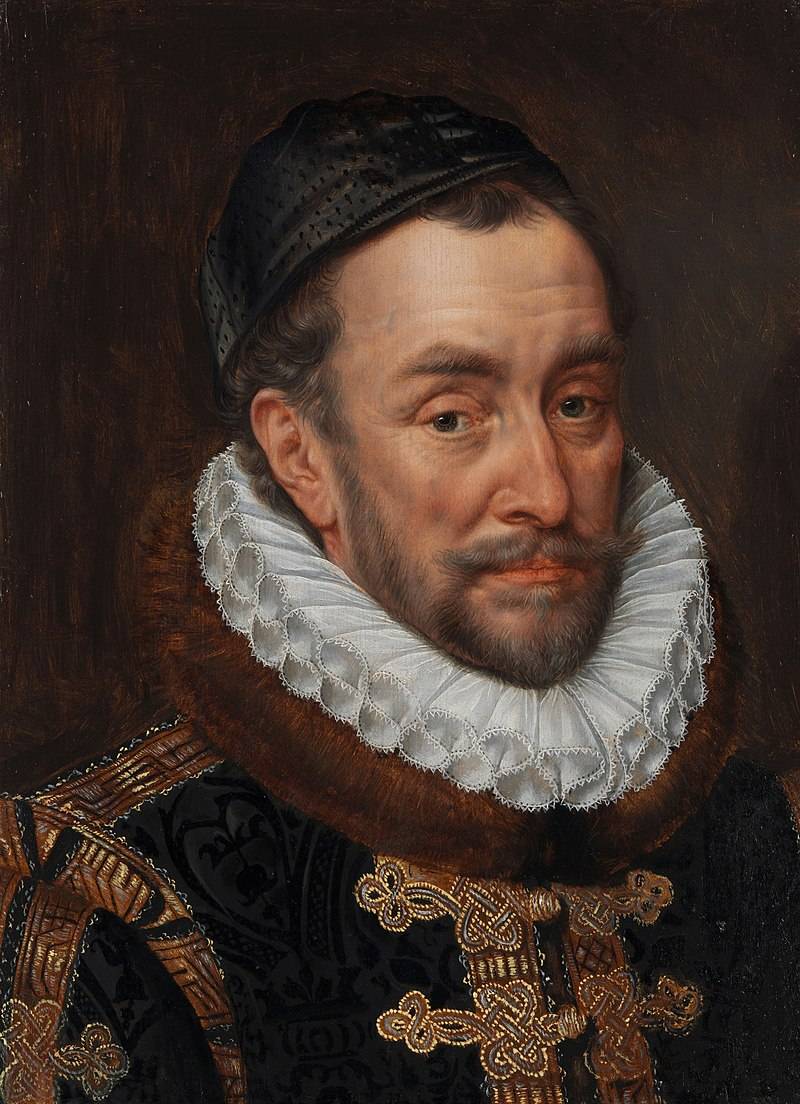
Another interesting thing: in spite of the oppositional moods and the preparation for full-fledged military operations, Wilhelm was initially not under any illusions about obtaining absolute monarchy in the Netherlands and unlimited power. Of course, he was not against such a scenario development, but he did not openly talk about it. At first, he wanted to return the privileges he had taken away for his country, while remaining under the crown of the Spanish monarch. True, he considered the option and with the entry into the German Empire as an Elector.
When the phase of action began, Wilhelm issued a manifesto in which he urged the people who inhabited the northern provinces of the Netherlands to start an uprising. But not against Philip II himself, but against the oppression of the "criminal satrap of Alba, who abuses the trust of the king and deceives him." It is curious that in the manifesto there were such words: “We are sure that His Majesty has incorrect information about Dutch affairs ...”. It is this position, as is commonly believed, that influenced the attitude of the nobility towards Wilhelm. If one part was trivially afraid of the consequences, others doubted its national consciousness.
Not in the political life of Wilhelm and without luck. The fate of the Netherlands, he learned, one might say, quite by accident. Without knowing it, the French king Henry II “leaked” important information to him. As already mentioned, William was one of the ambassadors to whom Philip entrusted the conclusion of peace with France. It is clear that the main negotiator was Duke Fernando Alba, hated by all the Dutch, but the French king confused something and decided that Oransky could also be privy to secret plans. Wilhelm, of course, did not refuse, and listened carefully to the monarch. All his worst fears were confirmed, the Spaniards, together with the French, intended to apply the toughest and crudest scenario to the Netherlands. Having received valuable information and food for thought, William quickly left the palace. By the way, precisely because of this stories Oransky got the nickname Silent.
Wilhelm understood that he needed to act quickly and as efficiently as possible. Without this, defeating such powerful opponents was simply unrealistic. Returning to the Netherlands, he first issued an appeal “on the removal of Spanish soldiers from the territory of the Netherlands”, drawn up on behalf of the States General. Naturally, Philip II was all for himself with anger. From that moment on, both the Spanish monarch and the Dutch prince stopped pretending and dropped their masks. Now they officially considered each other as the main and implacable enemies.
Oransky led the opposition, but the fighting was not in his favor, since the preponderance of forces was clearly on the side of Spain. Having suffered several painful defeats from the invading enemy forces (1567 year), Wilhelm had to leave the Netherlands. He went in search of allies and, most importantly, money. Since Orange had the title of German prince, the leader of the opposition could have his own army. The main thing is money. Therefore, he financed the new army from his own pocket, and then allies - the Huguenots - provided him with financial support. But the money was still not enough. Oransky understood that it was unrealistic to win the Netherlands campaign with the forces that he possessed. But he had no choice, since Philip II was very determined. The Spanish monarch perceived the Dutch prince as a bone stuck in his throat. And it needed to be eliminated.
As for the hostilities, here, Orange expectedly failed. And the union of the Dutch lands, if I may say so, was postponed. People frankly feared bloody reprisals from the Spaniards. But Wilhelm, who signed, in fact, his death sentence, went to the end. And his opponent acted prudently and methodically. In June 1580, the Spanish monarch issued a special manifesto in which he openly called on all Catholics to either find and extradite him to a Dutch prince, or simply to kill him (providing, of course, irrefutable evidence). For this, Philip promised various privileges and “golden mountains”. In general, for Wilhelm everything was probably the worst. Since there was no way out, at the end of July 1581 of the year he published the Act of oath renunciation. In this document it was written in black and white that Philip II did not cope with his responsibilities regarding the Netherlands. And if so, it means that he cannot be considered the legitimate ruler in the Dutch lands. In fact, this manifesto required two signatures - the Spanish king, who agreed with the document and the representative of the General States. For obvious reasons, the signature was only one - the Netherlands side. But, nevertheless, from the Spanish crown came the northern provinces of the Netherlands, which immediately merged into the Republic of the United Provinces. After that, Wilhelm, applying all his oratory skills, managed to convince the General States to recognize France as the sovereign of the Netherlands. Following this, the states of Utrech and the Netherlands designated William as their state halter.
The French, who agreed to take the Netherlands under their wing, of course, put forward a number of conditions. The most stringent was the requirement to put the Duke of Anjou Hercule Francois de Valois at the head of the province of Brabant. That's just the residents did not want to see the French governor and quickly raised a rebellion. Therefore, in May, 1583, Hercule Francois was forced to leave his patrimony. In Delft had to move and William I of Orange. The situation was tense. Wilhelm’s son, Moritz, later recalled that he himself “would rather jump from the tallest tower of The Hague, than he would accept sovereignty on terms that were put to his father.”
Everything went to the fact that William had almost no space for maneuver. Philip, who strictly adhered to his original tactics, managed to drive his opponent into a corner. The Spanish monarch and the Dutch prince understood that they did not get along. And to resolve the protracted conflict could only one thing - the death of either Philip or William.
Three attempts
Since Wilhelm walked on thin ice for a long time, his life repeatedly hung in the balance. It is for certain known about three attempts at the prince.
The first time they tried to kill him in 1582 year. The Spanish merchant Gasparo de Anastro was the victim of a confrontation between Spain and the Netherlands. As the war went on, his trading activities bent safely and Anastro was threatened with bankruptcy. Desperate, the merchant told a friend about his hard life - Juan de Izunka. Despite his long-standing friendship, Gasparo did not know that Izunke was in the secret Jesuit order. Juan pondered and some time later offered a friend a radical method - to eliminate the main cause of all his troubles. Namely - the leader of the liberation movement of the Netherlands, William I of Orange. In addition, Izunke said that the person who will kill William will receive a substantial financial reward, and the church will absolve him of all sins, because the cause is godly. In general, Juan directly told Gasparo that the Dutch prince must be killed. Anastro took time to think. On the one hand, he could solve all his problems in one fell swoop and become almost a hero. On the other hand ... the chances of success were frankly not enough. Indeed, in the event of failure, he would not only finally break up with the business, but also with life. Having suffered for several days, Gasparo nevertheless decided to kill, because he needed money at that moment like air. True, the Spanish merchant decided to cheat and, if possible, secure himself by shifting the responsibility to his cashier Venero. But Venero also was not eager to risk his own skin. He managed to convince his acquaintance Jean Hauregvi, who was a radical Catholic, of the need to kill the “heretic” Wilhelm. And Anastro and Izunke agreed with Venero in the correctness of the choice of "instrument". In addition, the spiritual mentor of Hauregwi named Anthony Timmerman was only in favor. He even blessed Jean for the murder of a Dutch prince.
Day X was scheduled for the eighteenth of May 1582. Izunk and Anastro left Antwerp that day and moved to Tournai, where the Spanish soldiers were. And Hauregvi, full of enthusiasm and euphoria from the "godly deed", confidently walked to the church, in which Wilhelm was to appear. But the attempt failed. No, Jean did not change his mind, the human factor intervened. Hauregvi did not think that the church would have so many people. Despite the efforts to break through the crowd to Wilhelm, he did not succeed. And the Dutch prince did not suspect that chance had saved his life that time.
But Jean Hauregvi was not going to abandon his plans. It must be said that the residents of the Netherlands were tense with France. A particularly severe aggravation occurred after the French soldiers entered Antwerp. Their goal was noble - to guarantee the inviolability of the city. But the townspeople perceived the appearance of foreign military in their own way. They were confident that the French had arrived in order to undermine the rights of local merchants and bring them to ruin. Given such sentiments of the masses, open conflicts continually occurred, ending in bloodshed. Wilhelm in this situation was between two fires. He needed to be able to change the point of view of the inhabitants of Antwerp in a short time and not lose the support of France during this time. The task, to put it mildly, before the prince was not simple. Therefore, he stayed in the city and held various meetings every day. On them, Wilhelm showed his tolerance (given that the French and the townspeople had different views on that score, it was not easy to do this) and called on the people to unite to achieve a common goal. At the same time, Oransky met with influential people, discussing pressing problems with them. At one of these receptions, Jean Haeuregvi was able to get through. How he managed to do it - is unknown. Barely a religious fanatic turned out to be one-on-one with Wilhelm, as he drew his pistol and fired. But Wilhelm was lucky. But the inaccuracy was saved by both Jean himself and his weapons. Wilhelm was wounded in the face and lightly contused. Guard did not allow to finish off the Dutch prince. The guards burst into the room and killed Hauregvi. During the search, by the way, papers were found which gave out the names of the customers of the attempt - Venero and Timmeran. Of course, they were soon found.
But the third attempt on Wilhelm failed to survive. He was killed by a religious fanatic Balthazar Gerard. It is known that the future enemy of all the inhabitants of the Netherlands, was born in the possession of the Spanish Habsburgs in Franche-Comté. He is a zealous Catholic and a real fan of the policies pursued by the Spanish king Philip II.
When the liberation movement gained strength in the Netherlands and it became clear that Protestantism was established as the main religion here, Balthazar wholeheartedly and truly (as befits fanatics) hated Wilhelm. Several times during conversations with friends, Gerard declared that he wanted to kill the Dutch prince, whom Philip II, so beloved by him, called the "scourge of Christianity and the enemy of humanity." Of course, this intention became known to "who needs it." Catholic monks, including Alexander of Parma, approved and blessed the aspiration of Gerard. And he soon went to create a "godly work."
First, Balthazar changed his name and became Franz Guyon. And then he managed, thanks to the tricks, to enter the service of Orange. Having achieved the original goal, Gerard began to prepare a plan for the assassination. According to one legend, he managed to find a certain soldier who sold a pistol and bullets of irregular shape to Balthazar. The fanatic wanted to be sure that the wound would prove to be fatal. And when that soldier found out against whom his weapons were used, he committed suicide.
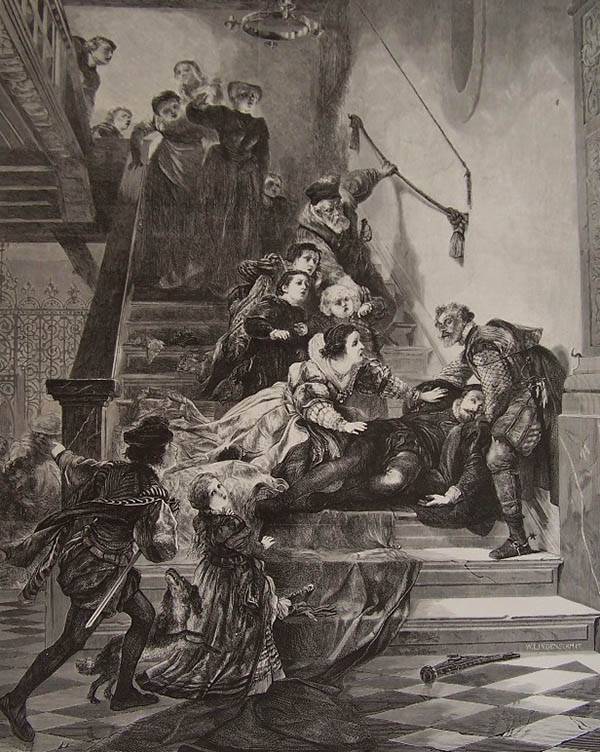
As for William, after the attempt of Hauregvi and the surrender of Antwerp, he was forced to move to Delft with his family and settle in the monastery. Since the health of the prince was undermined, he was undergoing treatment, but he found time for personal meetings and official receptions. That Balthazar and had to get on one of these audiences. Interestingly, Gerard initially believed in the correctness and necessity of his action. But then, suddenly, doubts began to plague him. And then his spiritual masters got down to business. They had a conversation with him and managed to convince him that Wilhelm must be eliminated. And on the tenth of July 1584, Balthazar said at the prince’s house and asked for a meeting. Since Wilhelm was busy, Gerard was asked to come in a few hours. But the killer knew that that was the answer. So he managed to hide in a dark corner near the stairs and waited. After some time, Wilhelm appeared in the company of several people. But Balthazar was not embarrassed. He jumped out of his hiding place and shot three times at the Dutch prince. After that, Gerard tried to escape, but the guards caught him. Unlike Hauregvi, Balthaza was unlucky. Soldiers caught the killer, but did not kill. And Wilhelm died almost immediately. Legend has it that before he died, he whispered: "O God, take pity on my soul ... Take pity on this unhappy people."
William I of Orange was buried in the New Church, located in the same Delft. And Balthazar was waiting for a painful trial. More precisely, all this time Gerard was tortured in every possible way, making so that death seemed to him relief. A long and brutal massacre of the murderer was thirsty and the crowd. The people demanded significant torment. And the execution, stretching for four days, began on the fourteenth of July right in front of the Delft Town Hall. Here is what is written about it in the judicial report:
And only after carrying out all these "procedures" the execution began. This document is also preserved:
By the way, during the terrible torture, according to legend, Balthazar sometimes stopped praying and compared himself to David, who managed to defeat Goliath. True or not, unknown. But to the crowd, enraged by the death of its leader, this seemed insufficient. An eyewitness to those events recalled:
Balthazar paid a high price. And Philip II, when he learned of the death of the hated Wilhelm, became generous. The first thing he did all the relatives of Gerard nobles, and at the same time granted them several estates in Fransh-Comte. The Spanish monarch hoped that now it would not be difficult to break the resistance of the Netherlands. The same was thought by the Catholic monks, who decided that with the death of William I of Orange, Protestantism would come to an end. But they were all wrong. The death of the leader of the liberation movement only rallied the people in the face of a common enemy. The inhabitants of the Netherlands, headed by Moritz of Orange (son of Wilhelm), began to confront Spanish soldiers with even greater success. And then it was decided to decapitate the liberation movement again. The Jesuit agent Peter Panne became the weapon of political and religious games this time. In 1595, he arrived in Leiden, where Moritz was located. Here, the spiritual teachers handed him the consecrated dagger, which it was necessary to eliminate Oransky. But the idea failed. Panne was exposed and soon executed. And the people continued the struggle for independence. By the way, thanks to the successful military campaigns of Moritz of Orange, the Netherlands found its modern borders.
The name of Balthazar Gerard, which is interesting, is one of the streets in his hometown Villafans, located in the department of Du (one of the departments of the Burgundy region - Franche-Comté in France).
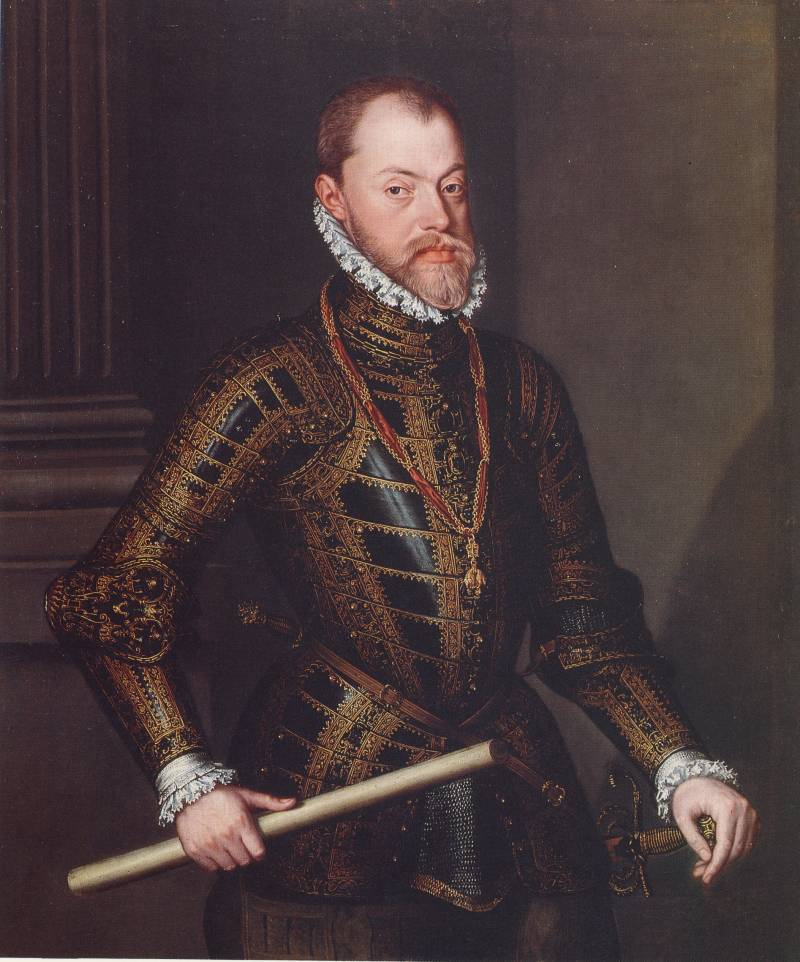
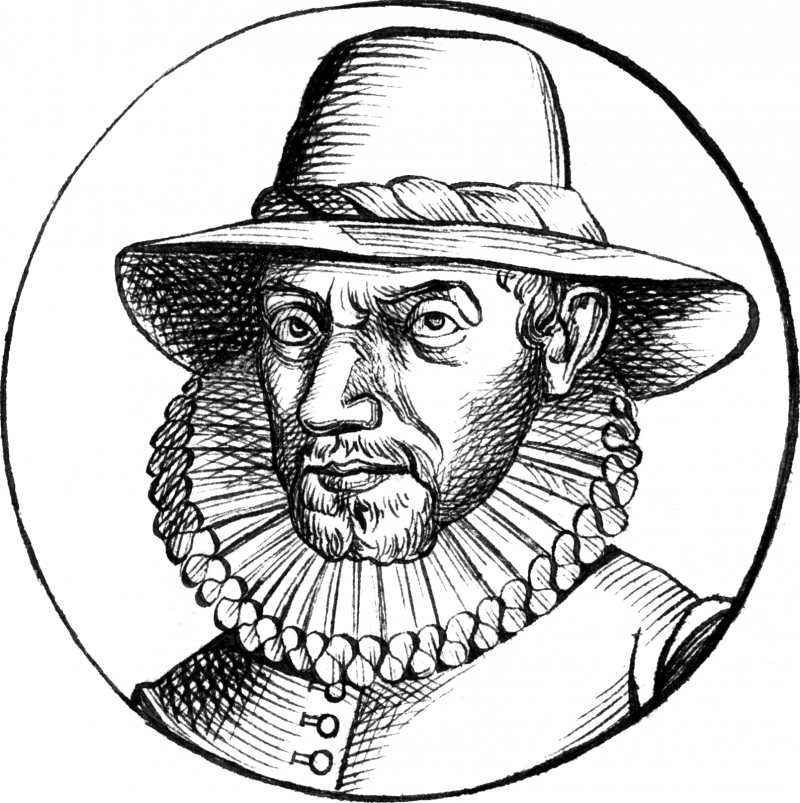
Information